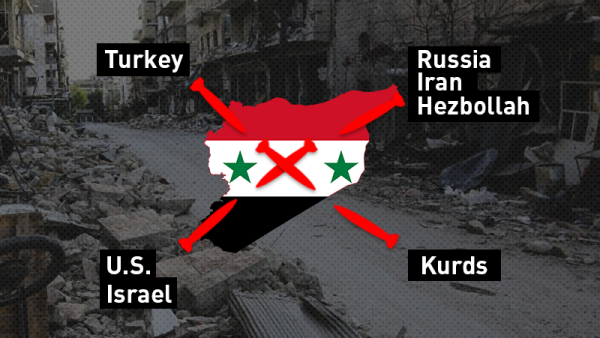- Turkey has launched a new operation in northwestern Syria
- The operation marks a newfound escalation in the Syrian conflict
- Other major powers are treating Syria as a staging ground for larger interests
- The (supposedly Civil) War in Syria is not winding down
By Ty Joplin
The Syrian Civil War, which has cost hundreds of thousands of lives, displaced over half the country and produced one of the worst humanitarian crises in modern history, is not winding down or slowly working its way toward a peaceful solution.
The war in Syria is mutating and has morphed so far beyond the original conflict between Assad and opposition groups that it barely resembles a civil war. Rather, the country has been so thoroughly divided between international powers battling over regional hegemony, that Syria is more a staging ground for warring parties.
Turkey’s latest major military intervention in Syria, ironically named Operation Olive Branch, launched over the weekend, seeks to eliminate the Kurdish military presence in northwestern Syria’s Afrin region. The offensive itself is no surprise, as Turkey has had its eye on Afrin for years.
What is surprising is the way in which the fate of Syria as a country now has little to do with the Syrian people or any opposition to Syria’s embattled president, Bashar al-Assad. Assad’s regime is now backed as the emerging ruler of an increasingly fragmented Syria. The fault lines of the myriad proxy wars fall along three axes: Turkey versus Kurdish groups, Iran/Hezbollah versus U.S./Israel and Russian interests.
Turkey Vs. Kurds
Aftermath of Turkish shelling of Kurdish targets in the Afrin Region of Syria (Mete Sohtaoğlu/Twitter)
Turkey’s latest intervention, Operation Olive Branch, involves mobilizing Turkish and Turkish-backed Free Syrian Army (FSA) troops against Kurdish militias in the Afrin region in northwestern Syria.
Turkey considers the Kurdish groups operating in Syria as part of the Turkey-based Kurdistan Worker’s Party (PKK), which Turkey deems a terrorist group. In working to oust Kurdish militias from Afrin, which lies on the Syria-Turkey border, Turkey hopes to also help neutralize the broader Kurdish threat against its government, which has been warring with the PKK since 1978.
Turkey’s president, Recep Erdogan, promised to also launch a new offensive against the Kurds in Manbij, Syria as well--something Turkey tried and failed to do in 2016.
The ongoing conflict between Turkish and Syrian Kurds puts the U.S. in a particularly difficult dilemma: Turkey is a vital NATO ally and major economic power, while the U.S. also sees Kurdish militias in Syria as a crucial partner in the war against the Islamic State (IS). The Kurdish-led Syrian Democratic Forces (SDF) have been one of the leading forces successfully combating ISIS, and have received logistical, material, and aerial support from the U.S.-led international coalition in the fight to eliminate the extremist group.
The U.S. then may be forced to pick sides in the proxy war between the Kurds and Turkey.
Iran/Hezbollah versus U.S./Israel
Hezbollah soldiers, AFP/FILE
Iran and its state-backed militia, Hezbollah, have been reliable allies of the Syrian regime, and have gamed the chaos of the Syrian Civil War to establish an indefinite military presence in the country. Though direct confrontations between the U.S./Israel and Iran/Hezbollah have been rare, both sides are positioning themselves in anticipation of a protracted geopolitical game of combatting growing Iranian influence in the Middle East.
Syria is in a strategic position for both Iran and Israel. Iranian groups have been working to establish a direct supply route from Tehran to the Mediterranean via Baghdad and Damascus. An alliance with Assad then also gives Iran the ability to operate freely in Syria and combat interests that would hinder Iranian power, such as the U.S. and Israel.
For its part, Israel shares a contested border with Syria with the mountains Golan Heights region, and has funded opposition groups in that area to help form a buffer zone between Israel and Syria/Iranian militias in Syria.
On Dec. 2, Israeli jets bombed an Iranian based under construction near Damascus, signalling two things: that Israel is willing to escalate the conflict in Syria to outward and direct aggression, and that Iran is now reformatting its operations in Syria to use the country as a regional launchpad for other potential campaigns.
Russia
A Russian soldier in Deir Ezzour, Syria (AFP/FILE)
Though Russia’s president, Vladimir Putin, announced his forces will withdraw from Syria and return to Russia, he’s made two military bases, a naval base in Tartus and an airbase near Latakia, permanent. Russia has been a critical ally for Assad, bombing opposition targets under the guise of fighting ISIS and sending Russian mercenaries to aid regime forces on the ground.
Russia has treated Syria as a test market for its burgeoning international weapons trade. Russia’s sole state-owned, Rosoboronexport, says that deals to the Middle East now account for a fifth of its total arms sales.
Putin though, faces domestic pressures to pull out of Syria as its involvement in the civil war has been unpopular. The war has cost Russia billions of dollars in a time when the Russian economy has been on sliding and poverty rates have been increasing.
The (Forgotten) Syrian People
A Syrian girl wounded by government airstrikes in 2015 (AFP/FILE)
While international powers use Syria as a means for war profiteering or as an opportunity for a power grab, the Syrian people are suffering and becoming less relevant. The same powers that have the ability to end the Syrian conflict, like Iran, Russia, Turkey and the U.S. also have invested interests in taking advantage of the war.
Although numbers are difficult to verify, around half a million Syrians have died in the war, over six million have been internally displaced, and another five and a half million have become refugees—all in a country with a pre-war population of just 23 million.







